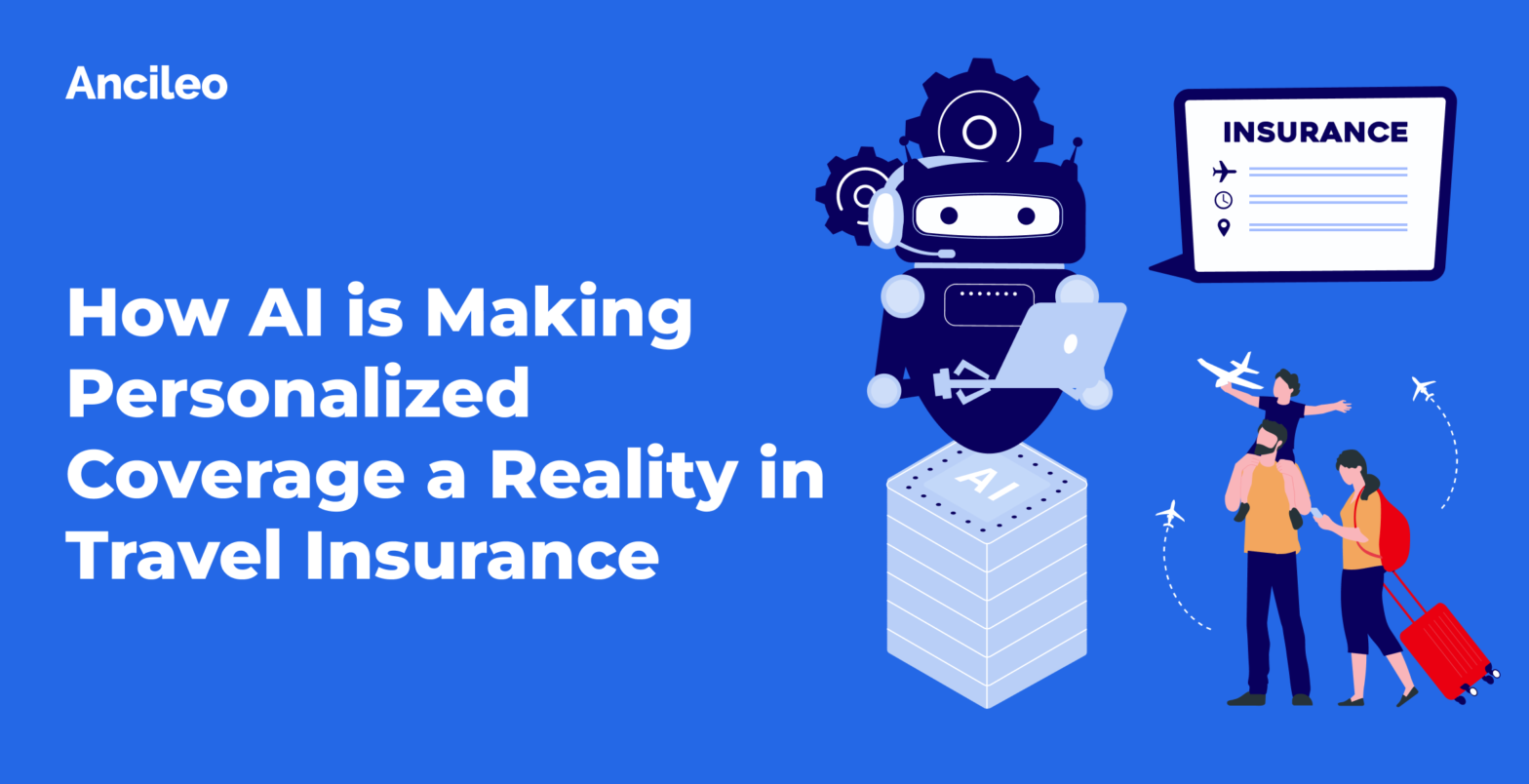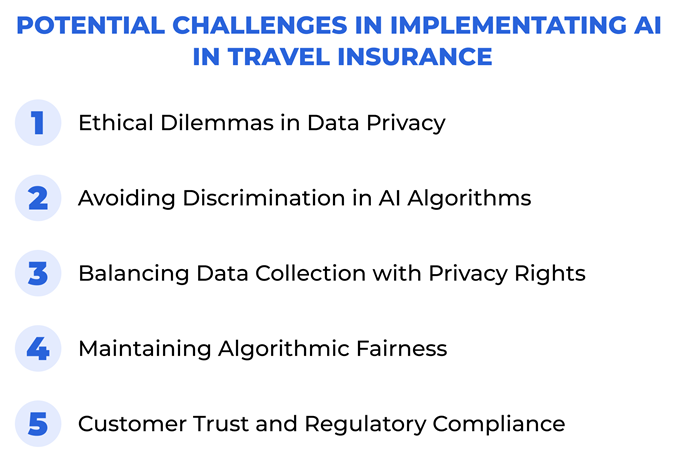
The travel insurance sector is on the cusp of transformation due to artificial intelligence (AI) advancements. Personalized insurance plans are increasingly vital, with travel becoming more varied and frequent. AI is streamlining operations and enhancing customer service in areas like claim processing and underwriting.
Personalization benefits with remarkably poised in Travel insurance. The generic approach is fading as travelers seek coverage tailored to their specific risks and preferences. AI’s data analysis and prediction capabilities allow insurers to provide highly customized products.
Modern travelers’ evolving needs fuel the growing demand for personalized insurance. They want flexible, adaptable coverage that suits their travel plans and lifestyle. AI’s predictive analytics and data processing are helping insurers create policies tailored to individual risk profiles and preferences.
For example, a regular business traveler may need a policy covering trip cancellation due to sudden meetings, while a backpacker might require adventure sports and medical emergency coverage. AI can analyze these different profiles, understand their unique needs, and create custom policies. This customization ensures optimal coverage and builds trust and loyalty with the insurance provider.
This article will guide you on how AI-driven personalization is revolutionizing protection on the move and fostering deeper trust and loyalty between insurers and their clients.
Leveraging AI for Personalized Coverage Options

Source: AI, Personalization, and Telematics Will Redefine Insurance – Unite.AI
AI uses machine learning algorithms to analyze vast amounts of data, including personal information, travel history, preferences, and behaviors. This data is then used to predict potential risks and design insurance policies that address these risks. The result is a highly personalized travel insurance policy covering each traveler’s needs and circumstances.
AI’s role doesn’t stop at creating personalized policies; it also extends to enhancing customer engagement. It can significantly improve customer satisfaction by offering policies tailored to customers’ needs and lifestyles. It, in turn, can lead to increased loyalty and trust toward the insurance provider, further solidifying the relationship between the insurer and the insured.
AI’s potential is also being harnessed to revolutionize group travel insurance. By analyzing group data, AI can identify commonalities and unique risk factors within the group, allowing for the creation of a group-specific policy. It ensures that each group member is adequately covered while providing cost-effective solutions for the entire group.
One of the key advancements facilitated by AI is the ability to make automatic policy adjustments in real time. With sophisticated algorithms, travel insurance policies can adapt to changing circumstances during a trip, ensuring that travelers are always adequately covered. Whether adjusting coverage limits, adding or removing specific features, or accommodating unforeseen events, AI enables seamless and dynamic modifications to policies.
AI’s capacity to process vast amounts of data allows insurers to understand and address the diverse needs of travelers. By analyzing individual preferences, travel history, and risk factors, AI can recommend tailored coverage options that provide comprehensive protection. This not only enhances the customer experience but also ensures that travelers receive precisely the coverage they require for their unique circumstances.
AI is crucial in proactive risk management within travel insurance. Using predictive analytics, insurers can identify potential risks before they escalate. This enables timely interventions and risk mitigation strategies, ultimately reducing the likelihood of claims. From monitoring geopolitical situations to assessing weather patterns, AI empowers insurers to stay one step ahead and offer a more secure and reliable travel insurance experience.
Case Studies of Travel Insurers Using AI for Personalized Coverage
Adopting AI in the insurance industry is a technological enhancement and a paradigm shift toward offering personalized coverage that aligns with each traveler’s unique needs and preferences. Here is how AI insurance companies are shifting towards AI for better personalized coverage.
Faye
Faye Travel Insurance stands out in the AI travel insurance landscape by championing a paradigm shift towards personalized coverage, courtesy of its innovative AI-driven app. Elad Schaffer, the Co-founder and CEO of Faye, underscores the app’s role in embracing the contemporary way people travel. Beyond the traditional insurance model, Faye’s app facilitates a personalized experience, allowing users to file claims swiftly for specific events such as flight cancellations, baggage delays, and medical emergencies. It ensures travelers receive tailored and speedy reimbursements while still on their journeys.
Faye Travel Insurance is committed to making travel insurance an integral and personalized part of each traveler’s experience. The app provides 24/7 support, integrates with travel itineraries to offer real-time updates and alerts, and employs AI to address potential travel disruptions proactively.
The insurer goes further by leveraging technology to offer personalized alerts for risks during the journey and notifying users when an incident qualifies for instant reimbursement to their phone’s digital wallet. This is fusion of travel, and fintech, presented in a user-friendly format accessible through travelers’ devices, makes personalized coverage a reality, ensuring that each traveler’s unique needs are met efficiently and precisely.
Allianz
AI insure tech Allianz Partners has ushered in a new era of personalized coverage with the Allyz mobile app, a groundbreaking digital platform tailored to transform the travel insurance landscape. Initially debuted in France, Germany, and the Netherlands, the app provided travelers with more than just insurance benefits; it offers a personalized, holistic experience designed to meet each user’s unique needs and preferences.
Allianz Partners introduced Allyz as a web app in 2020. It acts as a one-stop shop, offering personalized pre-travel advice, inspiration, and a secure repository for travel documents. Tomas Kunzmann, CEO of Allianz Partners, emphasizes that the Allyz solution goes beyond conventional coverage to provide travelers with an unparalleled “peace of mind” experience. The app utilizes advanced technologies to deliver a digital assistant experience, offering personalized services and real-time trip updates throughout the traveler’s journey.
In line with personalized coverage, Allyz offers customers exclusive benefits, such as lounge access, advance claims processing, travel health information, and Doctor Chat support. Furthermore, in response to the growing concern about digital threats, users receive six months of complimentary access to the Allyz Security app, reinforcing the commitment to safeguarding their digital lives.
Starr
Starr Insurance Company has used the Facebook Messenger Chatbot, designed to sell single-trip and annual travel insurance directly through the social platform. Leveraging artificial intelligence (AI), the Chatbot incorporates machine learning and natural language processing to engage in personalized conversations with mobile users seeking travel insurance. Through a series of questions, the Chatbot tailors a travel insurance plan to customers with specific needs and preferences, allowing for a seamless and efficient purchasing process within the chat interface.
Agnes Cheung, Vice President & Head of Accident and Health at Starr Insurance, highlighted the significance of integrating AI technology in travel insurance. Cheung emphasized that Starr is the first insurance company in Hong Kong to employ a Facebook Messenger Chatbot to deliver travel insurance services. The Chatbot’s design is aligned with the mobile lifestyle of younger consumers, offering a quick and convenient method for acquiring coverage without leaving their preferred social platform. This personalized and technology-driven approach reflects Starr Insurance’s commitment to simplifying its customers’ travel insurance purchasing process.
MSIG Mingtai
In a recent case study on personalized coverage in travel insurance, the collaboration between Appier, an AI SaaS company, and MSIG Mingtai Insurance, a Mitsui Sumitomo Insurance Group subsidiary, showcases the transformative power of AI-driven analytics. Zhi Chang Li, Executive Vice President of MSIG Mingtai Insurance. Emphasizes their commitment to making insurance selection easy for customers by actively adopting innovative technologies. Appier’s AI technologies have improved promotional campaigns and service procedures and created a more personalized and engaging experience for both potential and existing clients.
Appier addressed long-standing challenges faced by Mingtai. Such as a prolonged purchase and renewal cycle and difficulties in making accurate recommendations without a comprehensive understanding of customer profiles. Leveraging Appier’s data science platform, AIXON, and customer marketing platform, AIQUA, Mingtai implemented one-stop automated communication through AIQUA. Controlling marketing activities across digital channels. Appier’s AI engine enriched customer data, offering a 360-degree view of customers by labeling interests and keywords based on CRM data.
AIXON’s AI module also facilitated multi-dimensional user segmentation, identifying customer groups and enabling targeted personalized messages to enhance conversion rates while minimizing message interference. The successful collaboration underscores AI’s pivotal role in revolutionizing the insurance industry’s approach to personalized coverage.
Potential Challenges in Implementing AI in Travel Insurance

The transition to AI-based travel insurance is not smooth. It does involve a few barriers that need attention from the early adopters in the AI insurance industry. Here are some challenges for the use of AI in the insurance industry:
Crafting personalized coverages using AI involves delving into sensitive customer data. The ethical challenge lies in balancing utilizing this data to tailor insurance solutions and respecting individuals’ privacy rights. Insurers must establish, and clear guidelines on what data is collected and how it is. We ensure customers are informed. And consent to use their personal information. Failure to address these concerns can lead to breaches of trust and potential regulatory issues.
The risk of unintentional bias in AI algorithms poses a significant challenge. Insurers must meticulously design and continuously evaluate their algorithms to ensure they do not favor or disadvantage certain demographic groups. Discrimination may occur if historical data used for AI training reflects societal biases. Insurers must actively work to identify and mitigate these biases to ensure fair and equitable outcomes for all customers.
A critical challenge is the fine line between gathering sufficient data for personalized coverage and respecting privacy rights. To create compelling and tailored insurance solutions, insurers need a comprehensive understanding of customer behaviors and preferences. However, the policy is must be done within a boundaries of privacy regulations. Implementing robust data protection measures, obtaining explicit consent, and anonymizing data whenever possible are essential strategies to address this challenge.
As insurers utilize AI to personalize coverages, fairness in algorithmic decision-making becomes paramount. Insurers must regularly assess and refine their algorithms to prevent unintended biases and discriminatory outcomes. It involves ongoing monitoring, and adjusting algorithms when necessary. And employing techniques such as fairness-aware machine learning to promote equitable treatment across diverse customer profiles.
Building and maintaining customer trust is a continuous challenge in personalized coverage. Insurers must be transparent about how AI is used. assuring customer’s and their data are handled responsibly and ethically. Simultaneously, staying compliant with evolving data protection regulations is crucial. Regular communication, and clear privacy policies. And mechanisms for customers to voice concerns contribute to fostering trust and compliance with ethical standards.
AI’s role in personalized travel insurance is transformative. Offering a more targeted and efficient approach to policy creation and claims processing. AI in insurance claims allows for real-time risk assessment, dynamic pricing, and personalized coverage. Making travel insurance more accessible and relevant to individual needs. However, using AI also brings challenges and ethical considerations that insurers must address to maintain trust and compliance.
Innovation is crucial in the insurance industry to keep up with the rapidly changing risks and customer needs. Insurers must continue leveraging AI and other emerging technologies to enhance their offerings, streamline operations, and improve customer experiences. By doing so, they can stay competitive, meet regulatory requirements, and deliver value to their customers.
As we progress, insurers must continue refining their AI algorithms, ensuring they are fair, transparent, and adaptable to changing circumstances. They must also prioritize customer education, helping policyholders understand how AI determines their coverage and premiums. This way, the industry can fully harness the potential of AI, driving innovation while maintaining trust and fairness.
Personalized travel insurance, powered by AI, is not merely a trend—it is the industry’s future. Embracing this technology enables insurers to offer unparalleled service and coverage. Ensuring travelers can explore the world with peace of mind. Knowing they have a safety net explicitly tailored for them.